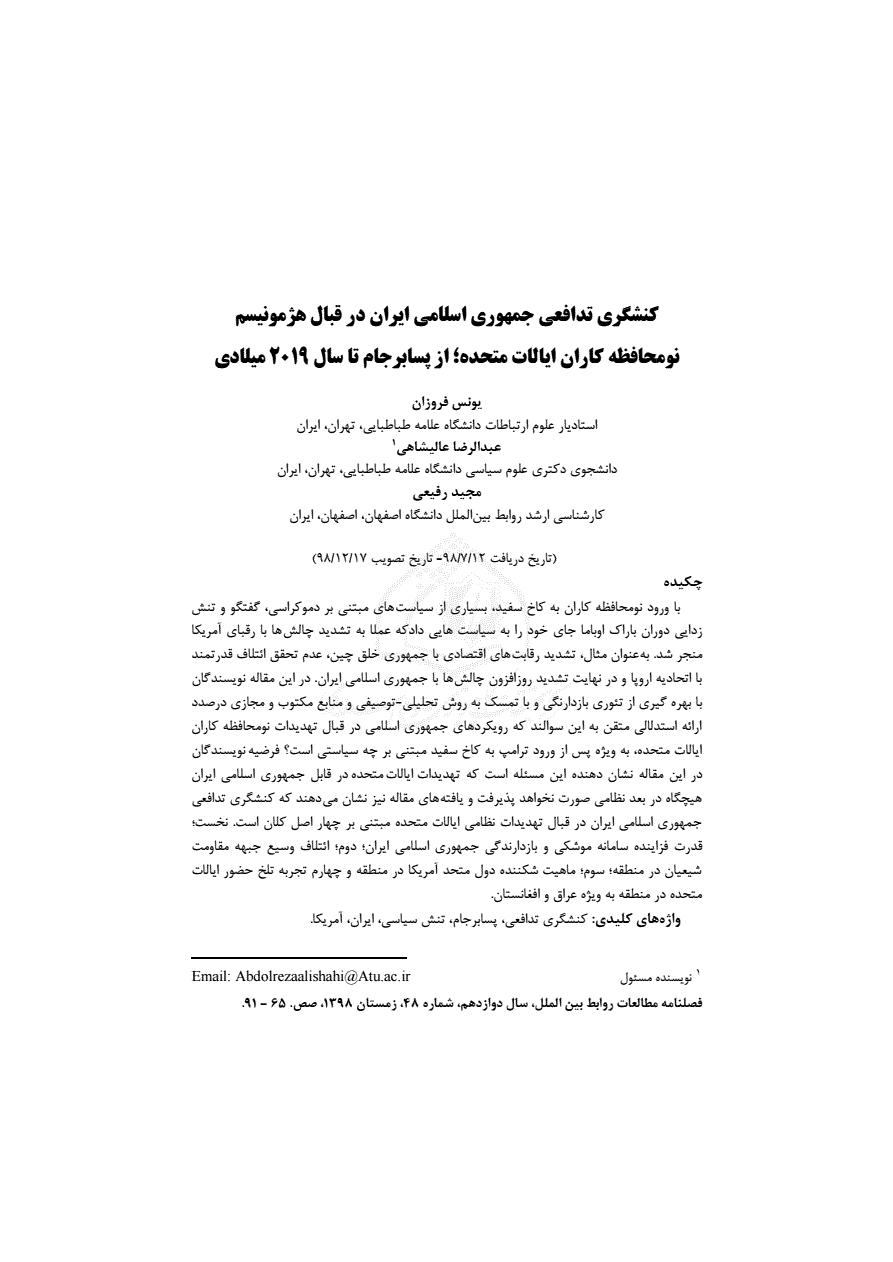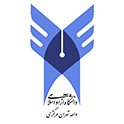چکیده:
با ورود نومحافظه کاران به کاخ سفید، بسیاری از سیاست های مبتنی بر دموکراسی، گفتگو و تنش زدایی دوران باراک اوباما جای خود را به سیاست هایی دادکه عملا به تشدید چالش ها با رقبای آمریکا منجر شد. به عنوان مثال، تشدید رقابت های اقتصادی با جمهوری خلق چین، عدم تحقق ائتلاف قدرتمند با اتحادیه اروپا و در نهایت تشدید روزافزون چالش ها با جمهوری اسلامی ایران. در این مقاله نویسندگان با بهره گیری از تئوری بازدارنگی و با تمسک به روش تحلیلی- توصیفی و منابع مکتوب و مجازی درصدد ارائه استدلالی متقن به این سوالند که رویکردهای جمهوری اسلامی در قبال تهدیدات نومحافظه کاران ایالات متحده، به ویژه پس از ورود ترامپ به کاخ سفید مبتنی بر چه سیاستی است؟ فرضیه نویسندگان در این مقاله نشان دهنده این مسئله است که تهدیدات ایالات متحده در قابل جمهوری اسلامی ایران هیچگاه در بعد نظامی صورت نخواهد پذیرفت و یافته های مقاله نیز نشان می دهند که کنشگری تدافعی جمهوری اسلامی ایران در قبال تهدیدات نظامی ایالات متحده مبتنی بر چهار اصل کلان است. نخست؛ قدرت فزاینده سامانه موشکی و بازدارندگی جمهوری اسلامی ایران؛ دوم؛ ائتلاف وسیع جبهه مقاومت شیعیان در منطقه؛ سوم؛ ماهیت شکننده دول متحد آمریکا در منطقه و چهارم تجربه تلخ حضور ایالات متحده در منطقه به ویژه عراق و افغانستان.
As neo-conservatives entered the White House, many of Barack Obama's policies of democracy, dialogue, and de-escalation replaced policies that actually exacerbated challenges with American rivals. For example, the intensification of economic competition with the People's Republic of China, the failure of a strong alliance with the European Union, and ultimately the intensification of challenges with the Islamic Republic of Iran. In this article, the authors seek to answer the question of what is the policy of the Islamic Republic's approaches to US neoconservative threats, especially after Trump's entry into the White House. This article by using analytical-descriptive theory and written and virtual sources try to answer this question. The authors hypothesize that US threats to the Islamic Republic of Iran will never take place in the military dimension, and the findings of the article also show that the Islamic Republic of Iran's defense action against US military threats is based on three major principles. First, The Increasing Power of the Missile and Deterrent System of the Islamic Republic of Iran, Second; the broad coalition of Shiite resistance in the region; Third, the fragile nature of the United States in the region; and Fourth, the bitter experience of US presence in the region, especially Iraq and Afghanistan.
خلاصه ماشینی:
کنشگري تدافعي جمهوري اسلامي ايران در قبال هژمونيسم نومحافظه کاران ايالات متحده ؛ از پسابرجام تا سال ٢٠١٩ ميلادي يونس فروزان استاديار علوم ارتباطات دانشگاه علامه طباطبايي، تهران ، ايران 1 عبدالرضا عاليشاهي دانشجوي دکتري علوم سياسي دانشگاه علامه طباطبايي، تهران ، ايران مجيد رفيعي کارشناسي ارشد روابط بين الملل دانشگاه اصفهان ، اصفهان ، ايران (تاريخ دريافت ٩٨/٧/١٢- تاريخ تصويب ٩٨/١٢/١٧) چکيده با ورود نومحافظه کاران به کاخ سفيد، بسياري از سياست هاي مبتني بر دموکراسي، گفتگو و تنش زدايي دوران باراک اوباما جاي خود را به سياست هايي دادکه عملا به تشديد چالش ها با رقباي آمريکا منجر شد.
نومحافظه کاراني همچون جان بولتون ، سياستمدار و سفير سابق ايالات متحده درسازمان ملل ، چارلزکراتامر، تحليلگر و مفسرسياسي، وريجنالد ديل از مديران مرکز مطالعات بين المللي و راهبردي واشنگتن با انتقاد از سياست خارجي دولت اوباما، آنرا ساده لوحانه و منفعلانه دانسته و معتقدند که سياست مصالحه رئيس جمهوري، آمريکا را نسبت به ديگر کشورها همچون روسيه ، چين و کره شمالي و جمهوري اسلامي ايران درموضع ضعف قرار داده است (ابراهيمي، ملکي و وثوقي، ١٣٩٦: ١٢٤).
در اين ميان برخي از مهمترين سياست هاي اجرايي بن سلمان که شکنندگي نظام سياسي سعودي ها را به همراه داشته است عبارتند از: - شکست در سياست هاي منتهي به تغيير رژيم ١ در عراق و سوريه ؛ - تعميق روزافزون بحران يمن ؛ - تشديد خصومت ها با جمهوري اسلامي ايران و ديگران شعيان منطقه ؛ - تعميق شکاف ها با قطر و اسلام گرايان اخواني همچون قطر و ترکيه (مسعودنيا، فروزان و عاليشاهي، ١٣٩٥) - سرکوب نيروهاي نوظهور جامعه مدني و دموکراسي خواه همچون جمال قاشقجي؛ - بايکوت شاهزادگان مدعي قدرت در داخل .

(پژوهیار,
,
,
)

